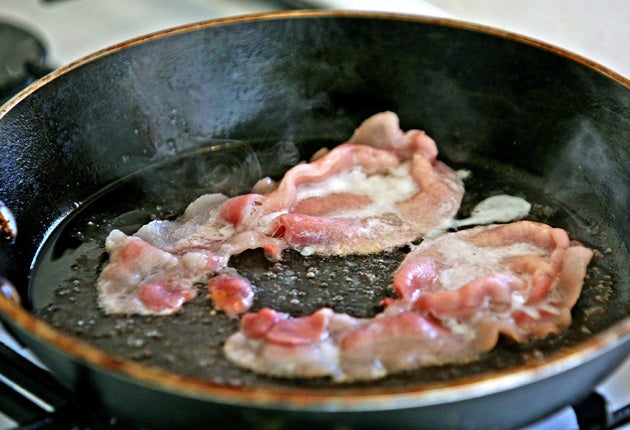Supermarkets must tell the truth about meat
Grocery chains to disclose when foreign meat is used in products 'produced in UK'

Your support helps us to tell the story
From reproductive rights to climate change to Big Tech, The Independent is on the ground when the story is developing. Whether it's investigating the financials of Elon Musk's pro-Trump PAC or producing our latest documentary, 'The A Word', which shines a light on the American women fighting for reproductive rights, we know how important it is to parse out the facts from the messaging.
At such a critical moment in US history, we need reporters on the ground. Your donation allows us to keep sending journalists to speak to both sides of the story.
The Independent is trusted by Americans across the entire political spectrum. And unlike many other quality news outlets, we choose not to lock Americans out of our reporting and analysis with paywalls. We believe quality journalism should be available to everyone, paid for by those who can afford it.
Your support makes all the difference.Supermarkets have agreed to own up to the large amounts of foreign meat in pies, pasties and sandwiches labelled as made in Britain, The Independent has learnt.
As part of a Government plan to end misleading food labelling, the biggest grocery chains will show clearly the origin of foreign pork, bacon and ham in processed products, some of which have been made to look British.
The change, to be announced by the Environment Secretary Hilary Benn today, comes amid complaints that shoppers wishing to support domestic farmers and higher animal welfare are being misled about the origin and provenance of meat.
Under an EU labelling loophole, retailers can mark products with foreign meat "Produced in the UK" if they have undergone a significant change in Britain. In the case of a pie, encasing foreign meat in pastry would justify the description Produced in the UK and the product could even carry a Union flag.
The policy allows supermarkets to undercut British farms by buying budget pork from the Continent, where welfare standards are lower and production is consequently cheaper.
Imports of foreign pig meat have rocketed since the UK set new rules on overcrowding and the treatment of pregnant sows in 1999, leading to a 40 per cent collapse in the British pig herd.
In 2007, more than half of bacon sold in the UK came from the Netherlands, Denmark, Germany and Italy, while 43 per cent of other pork products came from Denmark, Germany, Netherlands, Belgium and Luxembourg.
Civil servants, the pig industry, caterers and retailers have held talks in the Pig Meat Supply Chain Taskforce since Mr Benn signalled his determination to end misleading meat labelling in an interview with The Independent last January. Today, at an NFU conference in Birmingham, he will announce that Tesco, Asda, Sainsbury's, Morrisons, Waitrose, Marks & Spencer and the Co-op have signed up to a code of practice setting out exactly how foreign meat should be labelled. McDonald's, Wetherspoons and Whitbread have also signed up to the voluntary agreement.
They have committed to clearly display the country of origin on retail packs. If using the formula "Produced in the UK" they will have to add "using pork from country x".
Retailers will be banned from slapping national terms and symbols on products unless the pork is British and product specific terms such as Wiltshire Cure will mean that the pork used to make the product comes from within the UK.
Where the term "local" is used it will be clearly defined. Restaurants and pubs will follow the code by placing country of origin on menus.
Confusion over what counts as "outdoor bred" and "outdoor reared" pork will be cleared up with an announcement from Defra shortly. Shoppers can be misled into thinking pigs so labelled spend a lot of their life outdoors when it may only be a matter of weeks.
In his interview last year, Mr Benn complained: "If you buy something that has on the package 'Wiltshire cured bacon', I think most people would assume the bacon came from Wiltshire, but under the current European rules that is not necessarily the case. You may turn it over and discover that actually it came from Denmark."
Yesterday he said supermarkets would have to "provide clear information", adding: "The example I gave will be no more under the code because they will have to say from which European country was the ham cured in Wiltshire. It will be a big change."
Join our commenting forum
Join thought-provoking conversations, follow other Independent readers and see their replies
Comments